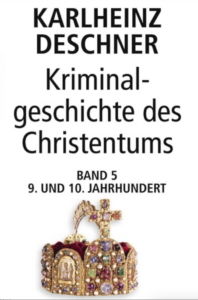Criminal History, 187
For the context of these translations click here.
PDFs of entries 1-183 (several of Deschner’s books
abridged into two) can be read here and here.
 Charles the Fat, to whom everything falls
Charles the Fat, to whom everything falls
The youngest son of Louis the German, Charles III (839-888), who was only given the nickname ‘the Fat’ (Crassus) in the 12th century by historians who probably wanted to express his meagre energy, was the heir to the smallest part of the empire—Alemannia and Alsace—and was initially unusually successful. But he was simply lucky. Without ambition, thirst for action or lust for power, everything fell to him as if by magic: Italy in 880, the imperial crown in 881, then the whole of East Franconia.
Having initially only ruled over the small Swabian kingdom since 876, he reigned after the death of his brothers, the ailing Bavarian King Carloman, who had renounced in favour of Charles in his last charter in 879, and King Ludwig III the Younger, who died on January 882 in Frankfurt without heirs. And after the death of the two West Frankish kings, Louis III, the victor of Saucourt, on 5 August 882, and his brother Carloman in December 884—the former lord of the north, the latter of the south of the Western Empire—Charles III was also recognised as emperor there. In 885, all secular and spiritual rulers submitted to him in the Palatinate of Ponthion, thus restoring the Frankish Empire.
However, he did not fight the Saracens, as the Pope had expected, but the Normans, as he had been constantly urged to do north of the Alps. And of course, he fought in his way; on his return from Italy, he first paid homage in Bavaria, then in Worms, before he surrounded the Norman camp in Asselt (Elsloo) on the lower reaches of the Meuse in July 882 with a huge army, including Lombard troops. But even when a lucky chance came to his aid when a terrible thunderstorm broke a breach in the walled fortifications, he did not storm off. He began to negotiate with the Normans after twelve days and bought their withdrawal with major concessions.
In return for an oath of allegiance and the promise of their leader Gottfried to become a Christian [emphasis by Editor], Charles ceded the province of Friesland to him. Gottfried, probably related to the Danish royal dynasty and often called king in the sources, was personally ‘raised from the holy spring’ by the emperor and allowed to marry Gisla, Lothar II and Waldrada’s illegitimate daughter. However, the attempt to integrate the prince into the Carolingian dynasty failed. And King Siegfried and the other Normans, reports Abbot Regino again, received ‘an immense amount of gold and silver: several thousand pounds of silver and gold’ (Annales Bertiniani), confessing that the pious emperor ‘had taken them from the treasury of St Stephen at Metz and other saints, and allowed them to remain, as they have done ever since, to devastate his and his cousin’s part of the empire’.
At the time, the emperor’s archchancellor, Bishop Liutward of Vercelli, was openly accused of having been bribed by the enemy and of having brokered the settlement together with one Count Wikbert. (In 887 the same ecclesiastical prince sued for adultery with the empress, and lost his court offices, whereupon he switched to Charles’ opponent Arnulf of Carinthia; in 899 the Hungarians slew him.)
Of course, the Norman misery did not end with all this, least of all in the Western Empire.